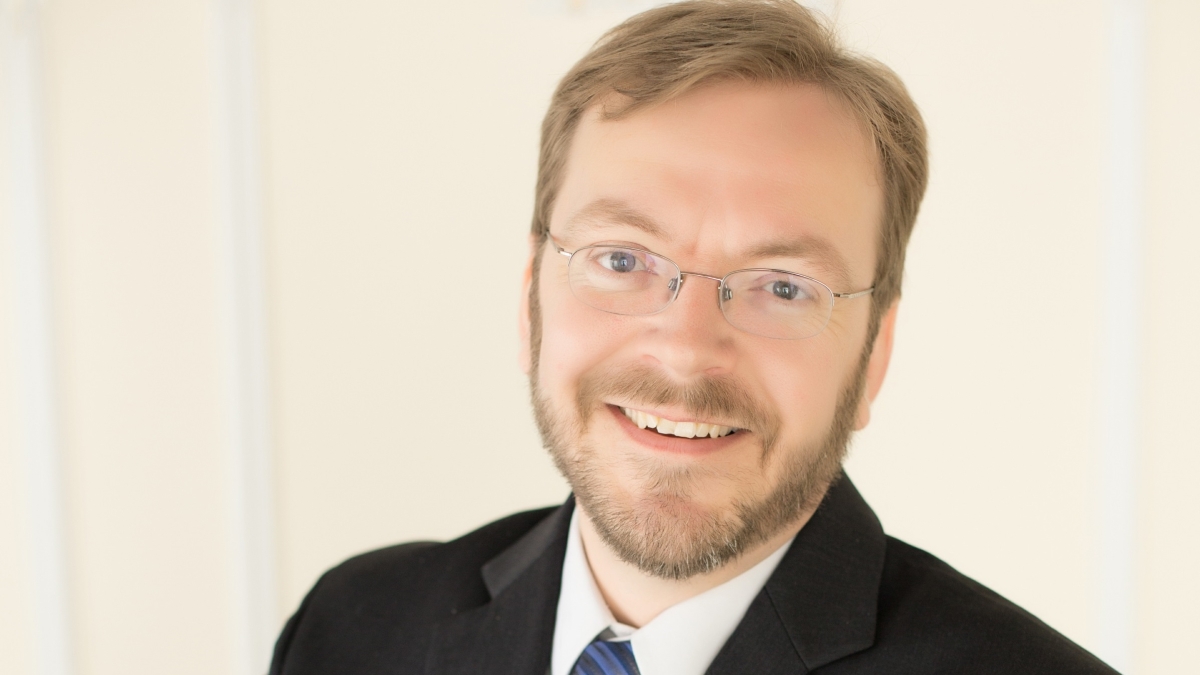ASU names Timothy Sandefur as Barry Goldwater Chair for 2023–24 academic year

Timothy Sandefur, School of Civic and Economic Thought and Leadership professor of practice and Barry Goldwater Chair in American Institutions for the 2023–24 academic year.
In a distinguished appointment, Arizona State University's School of Civic and Economic Thought and Leadership has announced Professor of Practice Timothy Sandefur will hold the prestigious title of Barry Goldwater Chair in American Institutions for the 2023–24 academic year. A prominent figure in the legal realm, Sandefur is also known for his role as an attorney at the Goldwater Institute, a nonaffiliated organization named in honor of the late senator.
Sandefur's professional journey is marked by his commitment to advocating for individual rights and limited government. As an attorney, he passionately pursues legal action against the government, addressing crucial issues such as private property, economic freedom and constitutional rights. At the heart of his work is a belief in setting legal precedents that safeguard the rights of individuals and contribute to a more just society.
Notably, Sandefur's focus extends beyond litigation; he engages in rigorous historical research on constitutional law and related topics. With eight published books, his writings cover diverse subjects, including biographies of historical figures such as Frederick Douglass and lesser-known philosophers like Jacob Bronowski. Sandefur's scholarly pursuits delve into the lives and ideas of influential figures who have shaped the trajectory of American thought.
Beyond his legal and scholarly endeavors, Sandefur is set to bring his wealth of knowledge and experience to the classroom. In spring 2024, he is slated to teach an interdisciplinary course on the American dream that will blend law, history, philosophy, art and economics. The course promises to explore economic liberty's profound role in American life, providing students with a comprehensive understanding of this fundamental aspect of the nation's ethos.
In addition, Sandefur will be giving a lecture on Nov. 28 titled “Economic Freedom and Democratic Participation.”
Question: What inspired you to choose the American dream as the subject of your class, and what key themes and topics do you plan to explore within this course?
Answer: The Goldwater Chair, established in 1977 upon Sen. Goldwater's retirement, aims to honor his limited government and free enterprise principles. The proposed course, "The American Dream: Economic Liberty as an American Institution," aligns with this vision, addressing the underemphasis and occasional critique of economic liberty in educational settings.
The class aims to explore the profound impact of economic freedom on American life. It challenges cynicism by highlighting individuals, such as Andrew Carnegie, who rose from poverty to great success through hard work. The course emphasizes the enduring nature of the American dream, dismissing claims of its demise and asserting that, as demonstrated by personal stories like the speaker's grandfather's journey from poverty to professional success, positive change is achievable in pursuing diverse American dreams.
Q: The Goldwater Institute fights for the liberties of business owners in Arizona. How have licensing laws affected economic growth within the state?
A: About a third of all occupations in the United States now require some form of government permission. In 2016, the Obama Administration issued a report warning about the expansion of occupational licensing, particularly because it falls heaviest on members of minority groups, immigrants and people who don't have the education or the political connections that are necessary to get a permit or a license. That word, “permit,” is important. Whenever you hear somebody use the word permit, you should always remember that the root word is “permission.” We're increasingly moving from a society of rights to a society based on permissions. Fortunately, Arizona is resisting this trend — for example, it passed a landmark licensing law in 2019, imposing no requirements on out-of-state licenses to own and operate a business, which opens the door for future economic development.
Q: Can you provide a sneak peek into your forthcoming lecture, “Economic Freedom and Democratic Participation”?
A: Behind this theme lies the observation that America is undergoing a breakdown in civility, marked by increased combativeness and a reluctance to engage in constructive dialogue about differences. The focus will be on economic freedom, exploring the adverse effects of restrictions on this freedom, including mechanisms like restrictive licensing laws that hinder individuals from pursuing trades or businesses without government permits.
Another point of scrutiny will be eminent domain abuse, where the government seizes homes for commercial development. These factors contribute to the breakdown in civil discourse. Anticipating why this breakdown occurs, the speaker argues that increased government regulation on economic freedom makes entering professions or earning a living challenging, leaving people excluded from society. Exclusion persists across generations, creating a class of individuals who believe the American dream is unattainable, fostering political cynicism and learned helplessness.
More Law, journalism and politics

'Politics Beyond the Aisle' series to explore the stories of public officials
In an effort to build a stronger connection between students and political and civic leaders, Arizona State University’s School…

ASU committed to advancing free speech
A core pillar of democracy and our concept as a nation has always been freedom — that includes freedom of speech. But what does…

ASU experts share insights on gender equality across the globe
International Women’s Day has its roots in the American labor movement. In 1908, 15,000 women in New York City marched to protest…

